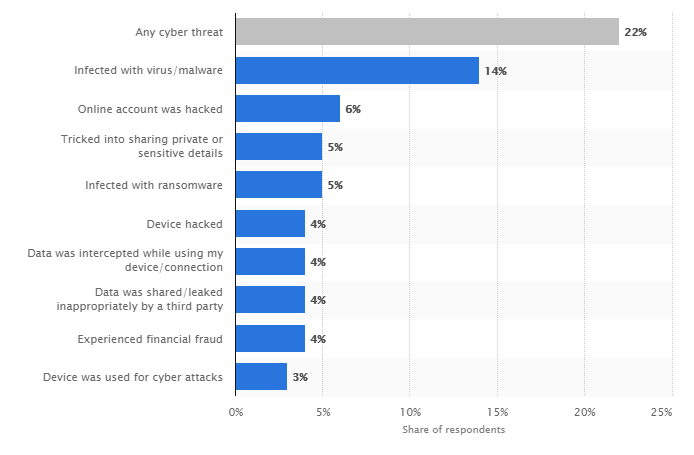Which cyber threats are the most widespread according to the recent survey
Cybercrime has developed over the course of a few recent years, this means that it has become more far-reaching and devastating. This is largely due to the improvements to the internet and other computer networking technologies: the internet has now made cybercrime knowledge less complex, and that knowledge can now be shared with greater ease; Blogs, chat and other online communities have all become easy media for the broadcast, dissemination and distribution of various types of information; this information could happen to be cybercrime related.
Hacking, which is a major aspect of cybercrime, has become much less complex, and cheaper to execute in recent times, with perpetrators taking advantage of modern network technologies such as cloud computing to carry out attacks.

Cyber criminals don’t even need to have the elaborate technical know-how that would have been necessary in the past to perpetuate various kinds of cybercrime today, the internet has the fundamental knowledge they need. In the face of all these, there’s the need to analyze just how much the present-day internet users are affected by the seemingly growing impact of general cybercrime.
A study carried out by ©Statista on 17,918 respondents (aged 18 and above) in the 2nd quarter of 2017 shows that 22% of global internet users have experienced one form of cyber threat or another; given the population of people in the world, 22% is quite a significant figure and no doubt a huge increase from the similar statistic some years ago. Cyber threats can take several forms, and in recent times, it is even more diverse in form. Of all cyber threats received by global internet users, malware and virus infections are the most prominent attack: that is a bit unsurprising, given malware and viruses are some of the frontiers of cybercrime in general.

In fact, malware and virus infections aren’t the only forms of cyber threats users are now exposed to; Online account hacking has affected 6% of worldwide internet population, and that percentage can be predicted to increase given the average modern day internet user now has more online accounts he manages and this definitely does increase susceptibility to online account hack. Internet users have also been tricked into sharing private and sensitive details (4% of worldwide users experienced this in the second quarter of 2017) or have their computers or devices outrightly hacked (4% of worldwide users experienced this in the second quarter of 2017), the list doesn’t just stop there. 5% of worldwide internet users suffered ransomware infections in Q2 2017, 4% have had their data intercepted while using a computer and a connection, and 4% have had their data shared inappropriately by a third party, all in Q2 2017.
With the wider range of forms of cyber threats recently experienced on the internet globally, it is pertinent to have a careful look at the developmental trend of cybercrime and come up with more comprehensive measure against attacks and infections, the use of security utility software cannot be overstated in these times. For ordinary individuals and organizations, even the simplest trusty antivirus could go a long way to help reduce chances of an attack, for larger organizations, it is necessary to invest in a comprehensive security solution for their online activities, and more importantly, have a robust crisis management system in a case of an attack. Users are undoubtedly more at risk of a cyber attack than they were some few years ago, and it is ultimately important that modern security measures be taken and improved online behavior be imbibed.





